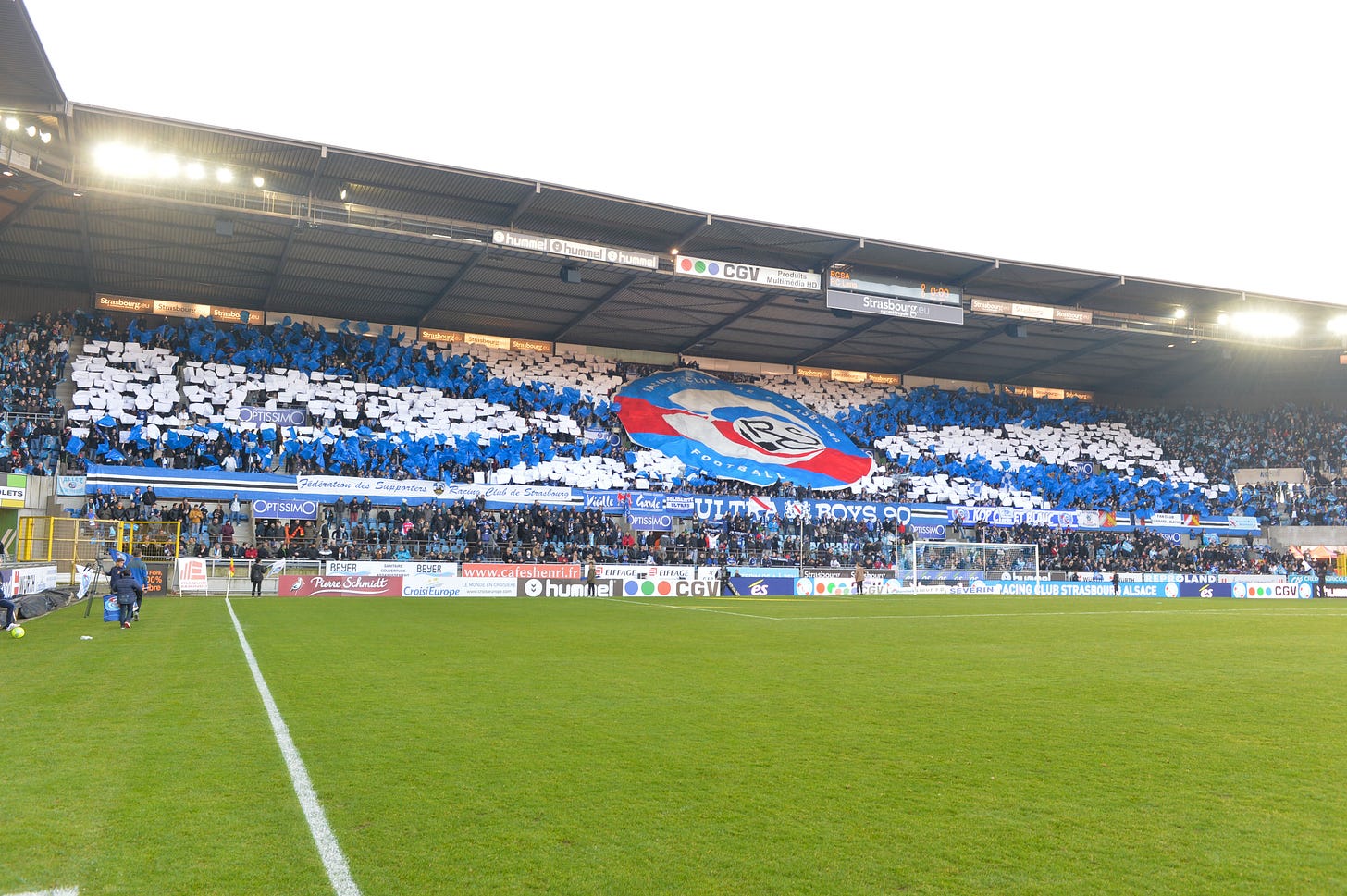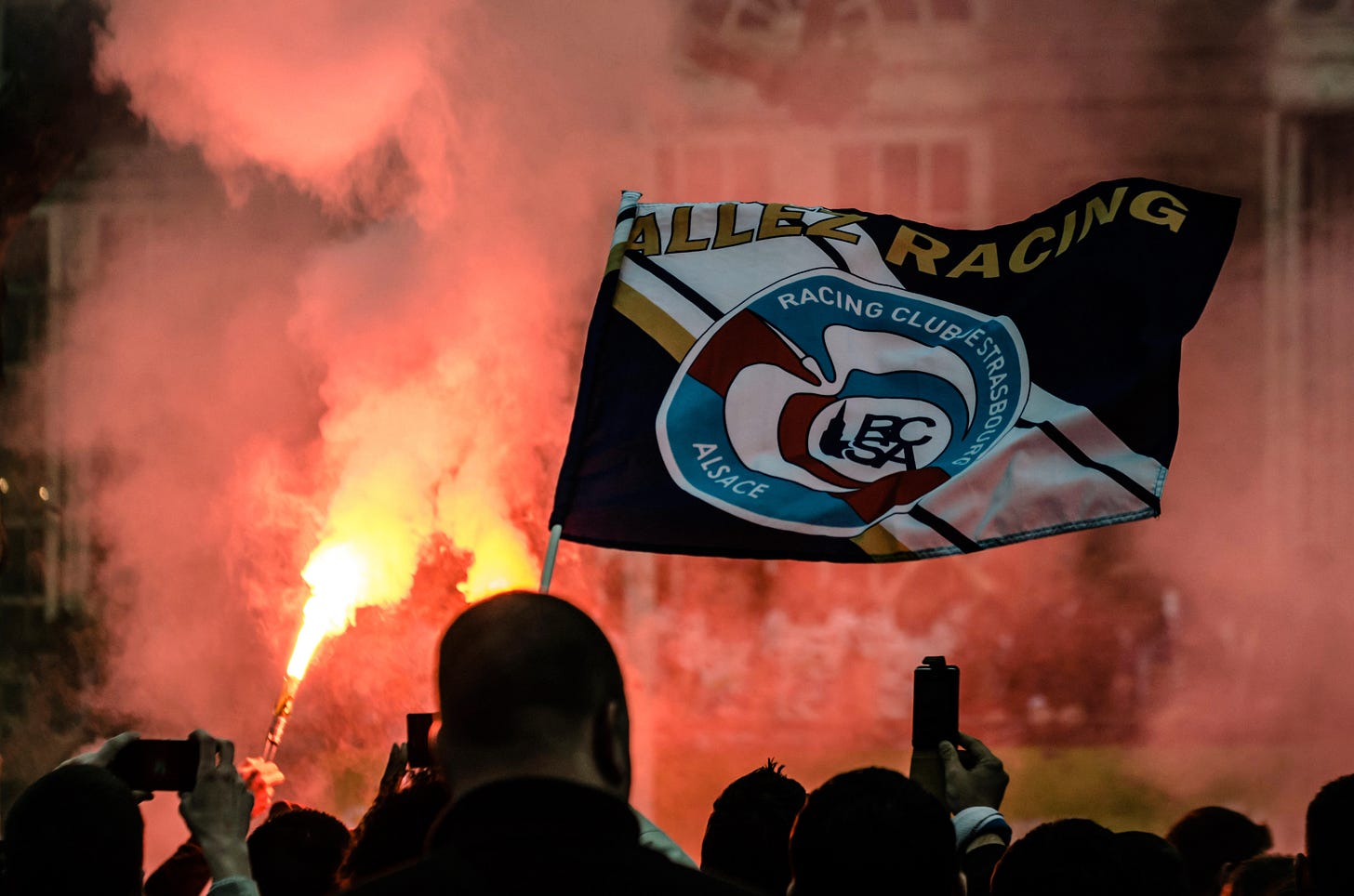The Faustian Football Club - RC Strasbourg: BlueCo & The Season So Far
Despite an impressive start to the season, a Todd Boehly-shaped ghost haunts supporters of the club.
When a young Johan Wolfgang Von Goethe came to study at Strasbourg University in 1770, the city's cathedral left him in awe. The world's tallest building between 1647 and 1874, its beautiful Gothic architecture persuaded him to write the pamphlet Von Deutscher Baukunst (On German Architecture), where he proclaimed its marvellous aesthetic forms as being distinctively German:
'An impression of oneness, wholeness and greatness filled my soul an impression which, because it consisted of a thousand harmonising details, I could savour and enjoy, but by no means understand or explain. They say that it is like this with the joys of heaven, and how often did I return to enjoy this heavenly-earthly bliss, to embrace the titanic spirit of our elder brethren (i.e. our fellow Germans) in their works.'
“Thank God to be able to proclaim aloud: that is German architecture, our architecture, since the Italian can boast none of his own, still less the Frenchman."
For Goethe, the Liebfrauenmünster zu Straßburg (known in French as the Cathédrale Notre-Dame de Strasbourg) was a source of pride, an artistic and cultural symbol around which Germans could rally. What is peculiar about the great writer's proclamation - alongside the factual inaccuracies of his opinion (research has shown that Gothic art originated in Northern France) - is that Strasbourg had been under French control for almost a century before Goethe's arrival. Annexed from the Holy Roman Empire by French King Louis XIV in 1681, the city remained a major centre of German intellectual and cultural life throughout the 18th Century; co-existence between German culture and French political administration would disintegrate in the 19th Century with the rise of centralising nation states. German culture would dominate the city again in 1870 following the Franco-Prussian War, but would once again be controlled by the French in 1919. Annexed by Germany in 1940, the issue of who controlled the city was firmly settled on the 23rd November 1944 with the liberation of Strasbourg by the 2nd French Armoured Division under General Philippe Leclerc.
This turbulent history has now firmly been left in the past. France and Germany are close friends, a partnership first established by President Charles de Gaulle and Chancellor Konrad Adenauer in the early 1960s and continued by their successors ever since. Strasbourg is home to the official seat of the European Parliament and the European Court of Human Rights, a reminder of the city's status as the symbol of Franco-German reconciliation. By no means the most famous city on the continent, Strasbourg should rank as one of the most quintessentially 'European' of them all: a city shaped by a long-standing history of cross-cultural entanglements, a city long burdened by centuries of conflict, a city which now serves as evidence of what a commitment to peace can achieve. It is a story that transcends national borders and continues to do so; Strasbourg is emblematic of the infinitely complex cultural and linguistic mosaic that has shaped modern Europe.

New Battle Lines
Strasbourg is nowadays not the battleground for competing national identities but footballing ones instead. The acquisition of Racing Club de Strasbourg Alsace by the Todd Boehly owned American consortium group BlueCo in May 2023 has angered supporters of the Alsatian club, who have been vocal in criticising their new owners. In March 2024, one of the club's most influential supporter groups - Ultra Boys 90 - released a scathing statement:
"Le Racing is now little more than a financial asset, under the bosom of an investment fund that already owns another club. We have said it before and we will say it again: multi-club ownership kills football and we will fight it!"
Attempting to ease these concerns, Clearlake Capital co-founder Behdad Eghbali has stressed that he is keen to elevate the footballing standards at RC Strasbourg and bring a new competitive edge to the club. This ambition was backed in the summer transfer window by a €55.4 million outlay which made the club one of the top spenders in France. This puts RC Strasbourg in an impossible bind. If the club wasn't owned by BlueCo, they simply would not have been able to afford such significant expenditure on new signings; but the current ownership situation treats them as a second-tier club, subservient to the interests of their 'big brother' Chelsea, a position which feels contrary to the ambition and competitive spirit which is supposed to underpin football.

An Englishman in Alsace
Despite this fissure at the heart of the club, Le Racing have started the season well. Currently in 8th place, the club have been transformed by the appointment of young English coach Liam Rosenior. Renowned for developing youngsters and playing attractive football, the 40-year has completely revolutionised the club's philosophy since replacing Patrick Vieira in July. With emphasis on maintaining possession, playing out from the back through short, intricate passing sequences, and constant off-ball movement to create space, Strasbourg's players have been encouraged to express their creativity on the pitch. When Rosenior arrived at the club, he stated that he "wanted to bring a style of play, a spectacle" based on both possession football and intense pressing, noting it was a philosophy that would suit the club:
"Alsatians are hard workers, with a mentality similar to the English. We need to play with passion, we need to run, we need to fight for the jersey".
So far this season, Strasbourg have lived up to this. This was made clear last weekend when Rosenior tactically outclassed Olympique de Marseille manager Roberto De Zerbi in a 1-0 win at the Stade de la Meinau. Strasbourg possess one of the youngest team's in world football; in their opening day fixture against Montpellier, 10 of the 11 players in the starting XI were under 23 years of age, the first time that has ever happened in Ligue 1 history. This lack of experience has led to lapses in concentration which have already cost Les Alsatians points this season, most notably against Lyon and Lille; but the team's youthfulness and the physical advantages this endows have also allowed Rosenior to implement an intense - and quite simply suffocating - pressing structure. De Zerbi's Marseille have been a classy side so far this season, yet struggled to play through the stifling Strasbourg game plan. Forwards Emanuel Emegha and Dilane Bakwa (and playmaker Sebastian Nanasi) successfully pinned back Marseille's two centre-backs and defensive midfielder Pierre-Emile Højbjerg, whilst the physical Ismaël Doukouré stuck tight to the creative Amine Harit. Short, quick passing sequences between Diego Moreira, Andrey Santos and Sebastian Nanasi allowed Strasbourg to play through Marseille, and Rosenior demonstrated his tactical flexibility as he reorganised into a 5-4-1 formation as his side closed in on an impressive victory. "We are a team who press and the players understand better and better how to do it." Exclaimed Rosenior following the result, "Tonight they did it exceptionally well".

Whilst Rosenior is undoubtedly a talented coach, he also has at his disposal a supremely promising group of players. Captain Habib Diarra is an athletic midfielder, a fine dribbler and possesses excellent close control, Chelsea loanee Andrey Santos is another midfield dynamite who has remarked that the club's style of play is "perfect for my qualities", whilst Diego Moreira has made a successful transition into an attacking full-back. The star so far, however, has been new Swedish signing Nanasi, a player described by his coach as having "an incredible technical quality, a really beautiful vision of the game". Arriving from Malmo for 11 million Euros, the silky 22-year old possesses exceptional on-ball qualities and a subtle right foot which has already provided three goals and an assist. The heartbeat of this exciting Racing side, it may not be long until he's on the radar of the other half of the BlueCo partnership.
In a city that was briefly home to Goethe, BlueCo ownership is a Faustian bargain for fans of RC Strasbourg: the club has acquired significant material and capital gain, but in the process has sacrificed its identity and soul. Yet it has led to the production of one of Ligue 1's most exciting team's, something even the most hardcore anti-BlueCo supporters can agree with. Whereas Young Werther in Goethe's novel of the same name is burdened by the sorrows of unrequited love, Strasbourg's young stars are unperturbed by tensions at the heart of Le Racing, playing a confident, energetic and fast-paced brand of football which has wowed supporters across France. It is a club worth keeping a strong eye on as they look to qualify for European football, the objective set by the club's ambitious (but controversial) new owners. The remainder of the season promises to be explosive in Alsace, both on and off the pitch.


